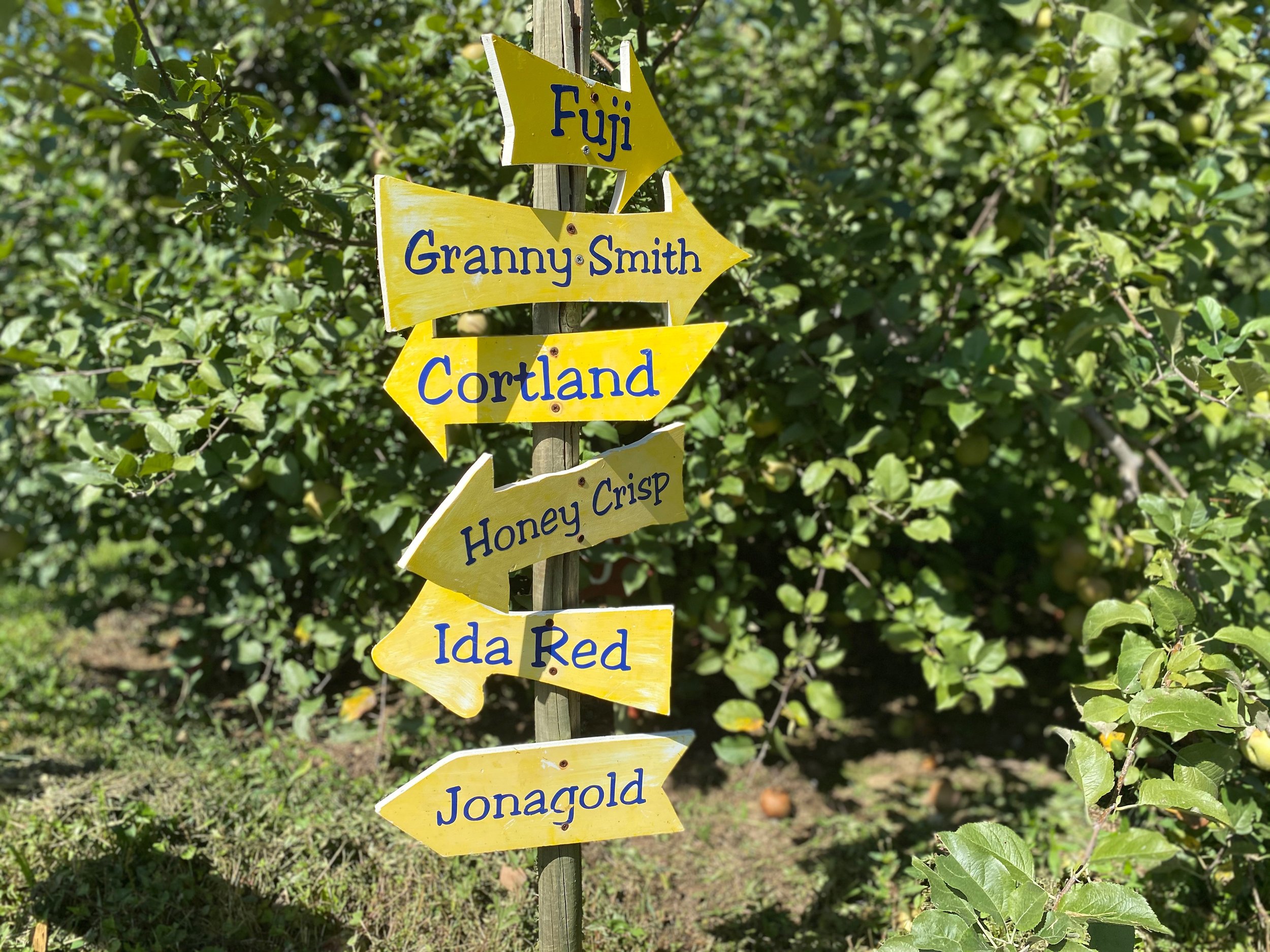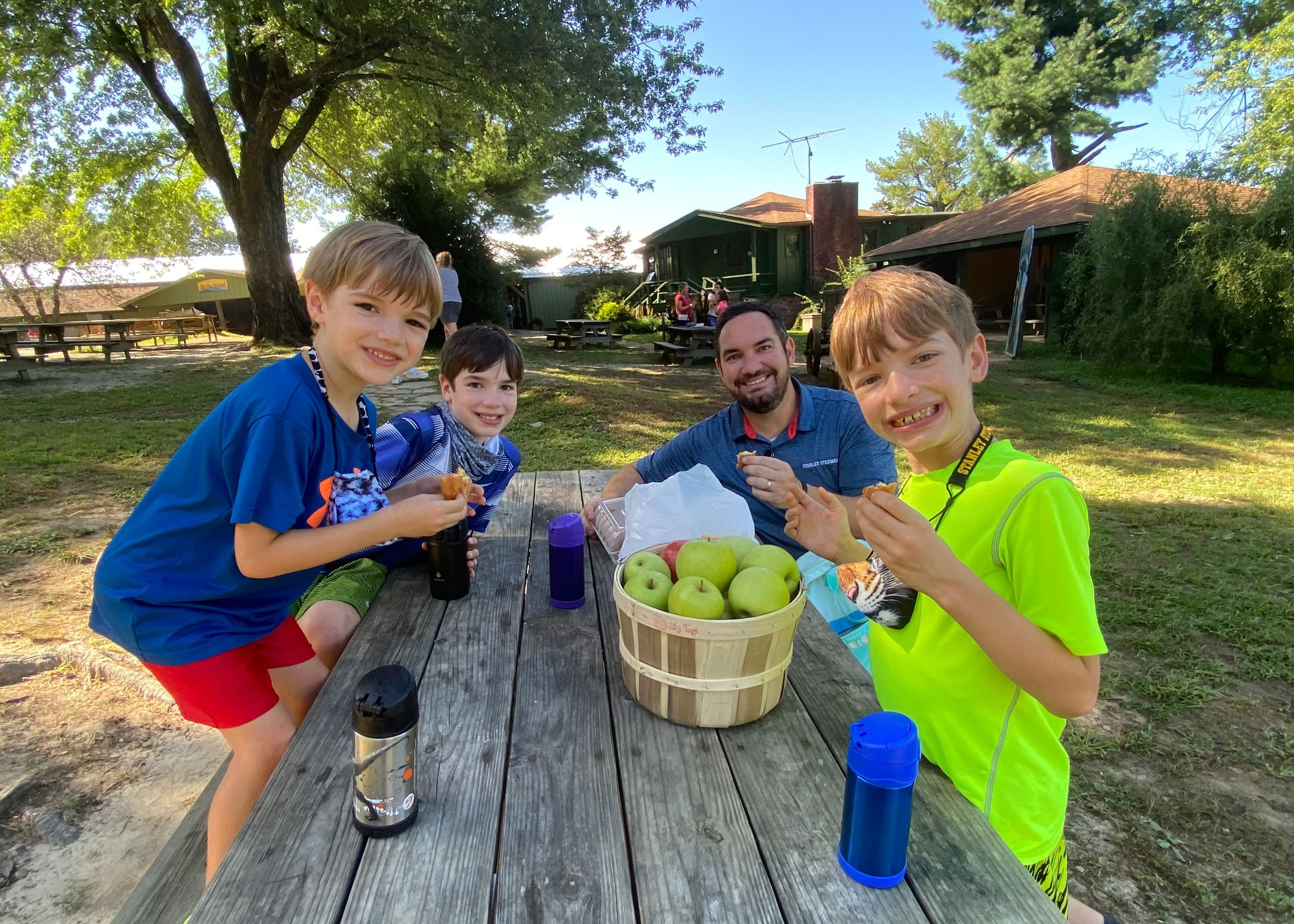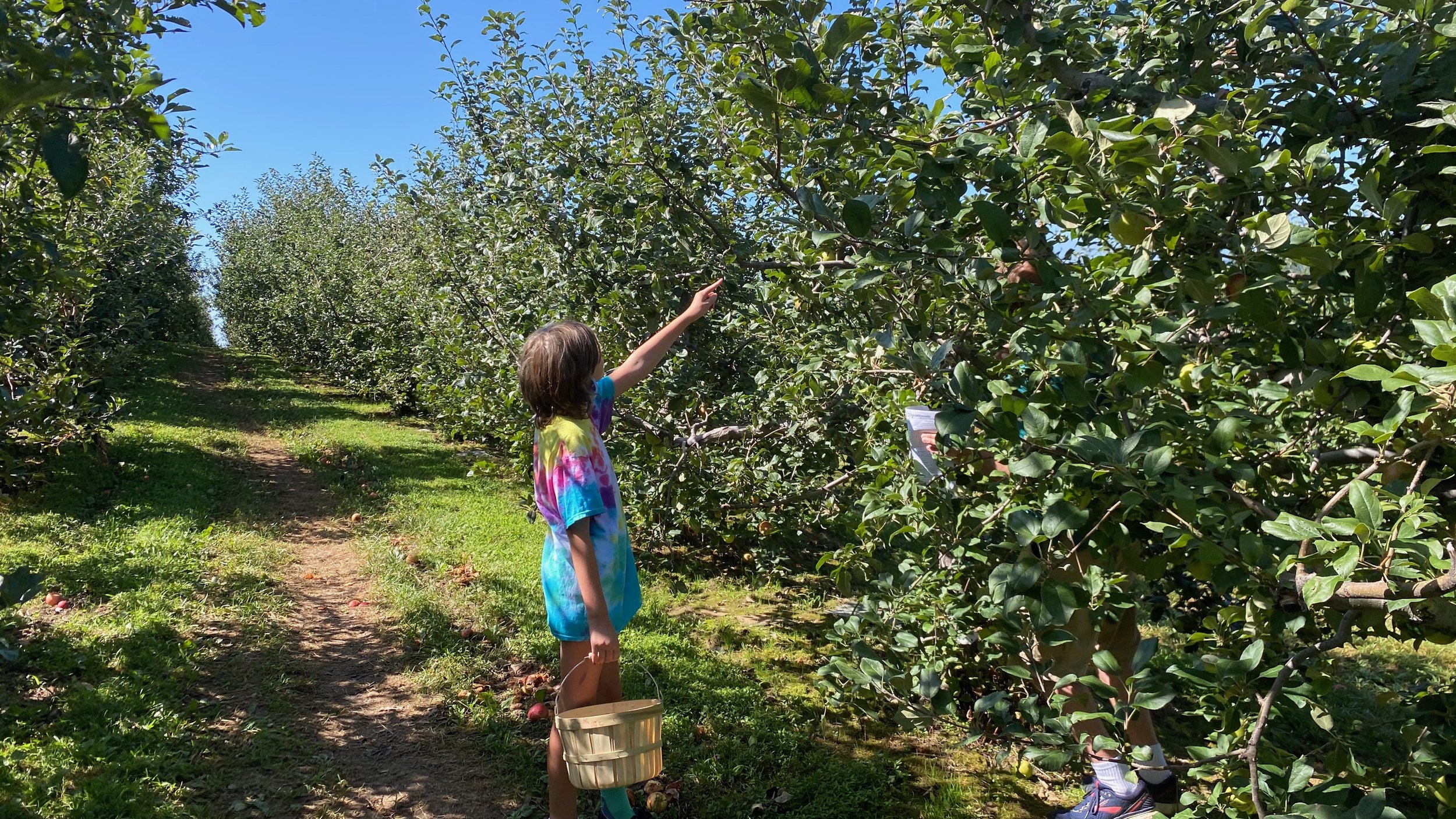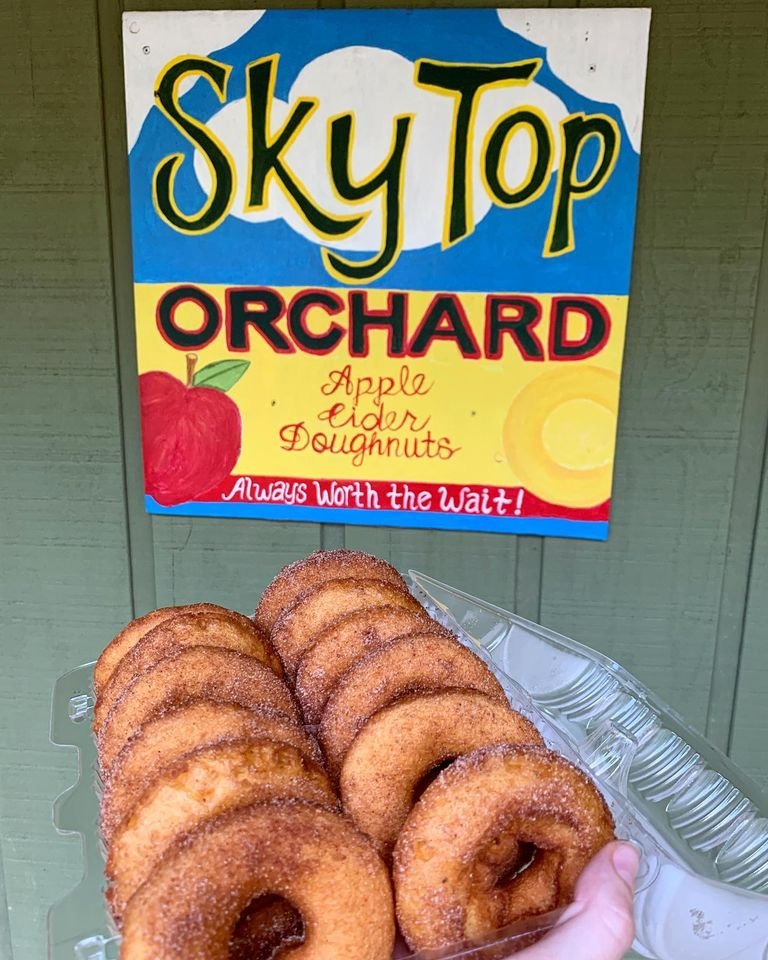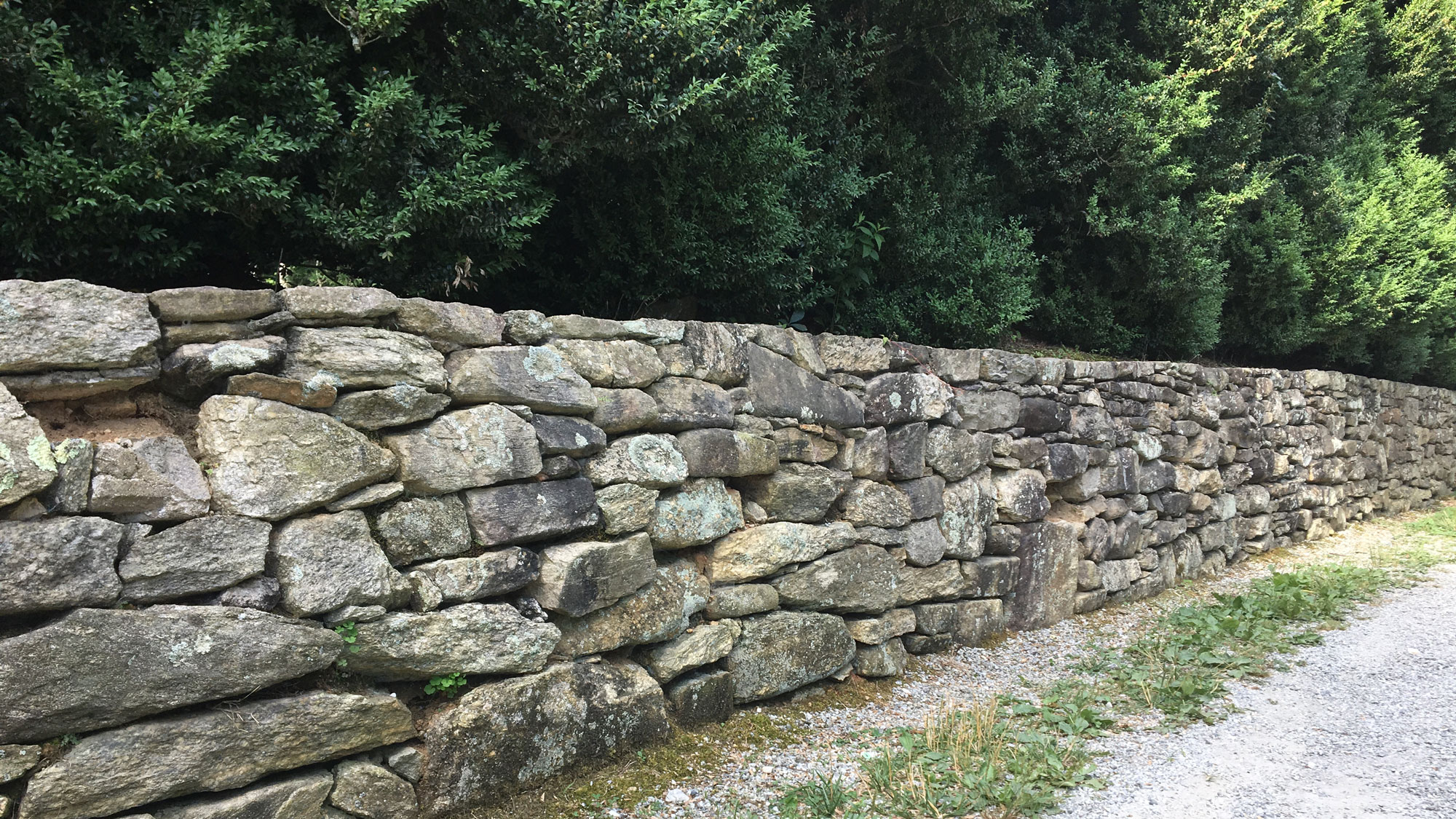Apples to Apples
/Apples to Apples
By Missy Izard Schenck
From Granny Smiths to Red Delicious, autumn in Western North Carolina delivers a bounty of sweet varieties from Henderson County’s 150 apple orchards. Occupying more than 5,500 acres, the county’s apple production ranks as the seventh largest in America and brings visitors from near and far to the orchards for wholesome fun like apple picking, hayrides, baked goods, and corn mazes.
When the first settlers loaded their wagons in 1783 to move to this area, they brought along seeds for vegetables, flowers, and fruit trees. They built log homes and cleared the field near their homestead where they planted fruit trees, including apples. These first pioneers grew apples to feed their families. The red and golden apples were eaten fresh in early fall and used to bake pies and cakes as well as make applesauce, fried apples, cider, and cider vinegar, dried apples, apple butter and jelly. Today, the descendants of these early pioneer families, (Barnwell, Coston, Dalton, Edney, Enloe, Freeman, Gilbert, Henderson, Hill, Jackson, Justus, Lamb, Lancaster, Laughter, Llese, Lyda, McConnell, Merrill, Moore, Moss, Nix, Staton, Stepp, and Waters), are among the full and part-time apple growers who make Henderson County the No.1 apple producing county in the state.
In his 1970 book, Postmarks, Lenoir Ray said, “The words apple and Edneyville are almost synonymous. Mountains and orchards appear seamlessly sewn into the scenery of Edneyville.”
Along with Fruitland and Clear Creek, these lands boast a heritage of some of the earliest settlers and apple orchards in Henderson County. Ray referred to pioneer William Mills as “Billy Appleseed,” crediting the early settler as the pioneer of apple production in what would become Henderson County. Mills wasn’t the only early settler to plant apple trees, and it wasn’t until access to and from the mountains via improved roadways, the railroad and modern equipment arrived that the region’s apple industry surged, pushing it to become top producer in the state and one of the leading producers in the nation.
In 1883, Wilbur G. Zeigler wrote:
“The apple finds a congenial home among these Southern mountains. Horticulturists are just beginning to appreciate the advantages of the thermal or ‘no frost’ zone … like conditions of climate exist nowhere on the continent … the climate conditions with respect to moisture are favorable, and in some respects superior to famous fruit-growing districts.”
Although early settlers planted apple trees for subsistence and barter, the industry would not gain traction until much later. Among the first to process apples commercially in Henderson County was orchardist and philanthropist, Melvin Lane (1902-1988). He organized the Dana Co-op in the 1930s as a means of apple storage and built the first refrigeration facility in the county. “Some growers use to haul apples to Asheville to put them at the ice company,” stated horticulturist Fritz McCall of Dana. Lane was also one of the first orchardists in the county to subject his crops to government inspection before laws made this a mandatory procedure. He left a legacy that lives on in the county’s apple industry today.
In 1936, early apple growers organized the Blue Ridge Apple Growers Association to promote Henderson County apples and in 1954 the North Carolina Apple Growers Association was formed. In 1947, the Blue Ridge Apple Growers Association along with the Henderson County Agricultural Extension Service and the Chamber of Commerce organized the Apple Blossom Festival held each April, later changing it to late summer and the name to the North Carolina Apple Festival, which climaxes each Labor Day with the King Apple Parade down Main Street in Hendersonville. The apple industry expanded through the mid-1930s and then slowed down until the 1950s and 1960s when enhanced techniques, technology and transportation accelerated production.
Kenny Barnwell, a Henderson County apple producer and farmer, works tirelessly on behalf of the apple industry in Henderson County. The 2001 Southeastern Apple Growers “Apple Grower of the Year,” Barnwell is a former president of the N.C. Apple Growers Association and is involved in numerous boards and committees promoting apple growers in North Carolina. “When I returned to the family operation after I graduated from Greensboro College in 1980, the apple industry in Henderson County was a thriving business. At that time there were 33 packing operations and almost 10,000 acres of apple orchards. Today there are only four packing operations and about 5,500 acres of apple orchards.
In the late 1980s, the apple market in Henderson County began to disappear. This change was brought about using controlled atmosphere storage in Washington State enabling Washington growers to market apples year-round; later, China began exporting apples to the United States. Food imported into the U.S. does not have to meet safety and environmental guidelines that farmers in the USA must meet. Growing apples in the 1990s in Henderson County was a challenging undertaking. The loss of market and the boom in real estate forced many growers to make hard decisions.
At this same time, Mountain Research Station in Fletcher, N.C. showed that many new varieties of apples, Gala, Ginger Gold, Honey Crisp, Pink Lady, and Mutsu would grow well in the climate of Henderson County. This new production of apples opened new markets for local growers in large markets such as Atlanta, Charlotte and all of Florida.
In addition to the Apple Festival, Henderson County now celebrates its 235 years of apple harvests with the Apple Country Cider Jam in April. With the growth of the beer industry in Asheville, Henderson County caught the attention of Bold Rock Hard Cider, the nation’s largest independently owned cider company. Bold Rock chose to open its doors in Mills River and the beginning of this new industry has now gained steam in the area with three cideries calling Henderson County home and several more within driving distance. Today many of the Henderson County orchards have turned to agritourism and found it to be a very successful route for their farms. In addition to offering “you pick apples” a plethora of activities is offered. One such orchard, Sky Top, is right in my backyard in Flat Rock.
Lindsey and David Butler, Owners of Sky Top Orchard
Recently, I visited neighbors and friends of mine, Lindsey and David Butler, at their family orchard in Flat Rock, N.C. Back in the 1960s, David’s father, Everette Butler, purchased a home in Flat Rock. He’d fallen in love with the area bringing David and his siblings to summer camp each year. When his father purchased the land, it only had a few apple trees, and he hadn’t intended to operate an orchard. It wasn’t long before Everette began exploring the idea of farming apples and sought help from a local farm extension agent. By 1968 Everette had pieced together some 70+ acres he bought from Gordon McCabe of Kenmure and the Bell Family of Tuxedo. Soon Mt. McAlpine was full of apple trees and thus began the Sky Top commercial apple farm, which sold exclusively to area supermarkets and businesses.
More than 50 years ago, David Butler spent a long winter helping his father plow the ground for 2,500 apple trees on Mt. McAlpine which overlooks the southern end of what is now the Village of Flat Rock. Little did that teenage boy know that he was planting the seeds for a very successful and rewarding life as the owner and operator of one of Henderson County’s most iconic apple orchards.
Today, David and his delightful wife/business partner, Lindsey whom he met while in college at The University of South Carolina, spend each fall overseeing Sky Top Orchard — a bustling agritourism business that attracts thousands of visitors to Flat Rock each summer and fall. What started in the 1960s as a commercial apple orchard is now a go-to destination for families and friends to pick apples, purchase apple cider, visit with Sky Top’s cute menagerie of animals, take old-fashioned hayrides, enjoy picnics and, most importantly for many, eat the very best apple cider doughnuts in Henderson County.
“When I met David, said Lindsey, Sky Top was not open to the public. It was strictly commercial.” Sweeping her arm towards the hubbub of activity in the Sky Top pavilion and the orchards beyond, she adds, “I never dreamed that we would be doing all of this.”
David and Lindsey continued with commercial apple operations through the 1970s. Then in 1980, Lindsey proposed an idea that would dramatically alter the look of the Sky Top Orchard operation for the next 40 years. “She had the idea to offer an option of ‘you-pick’ because a lot of people wanted to come out to the farm to get some fresh fruit,” David explains. At the time, however, David wasn’t fully on board with the idea. “I reluctantly said ‘yes.’” And then with a grin adds, “Throughout the years I’ve learned that it was a very, very good decision.”
There are approximately 80 acres in production, and the Butlers now own a total of 120 acres. These days they live in a house on the property set high on a hillside with incredible sweeping views of the mountains of both North and South Carolina. The orchard has two full-time employees, a half-dozen part-time and, as Lindsey describes them, a “multitude” of friends, children and seasonal employees who keep Sky Top running smoothly for the season which starts August 1 and runs through December 1.
After four-plus decades of operating Sky Top, David and Lindsey have also discovered that a successful business can be measured by much more than dollars and cents. It is their home. It is the place they raised their three children. And it is the place that has allowed them to literally host generations of families that return to Sky Top year after year.
For now, when the season ends and David and Lindsay sit down to discuss how much longer they will continue to operate Sky Top, David has the same answer prepared every year. “I always tell Lindsey, ‘one more year. Let’s do it for one more year.’”
—-
For more information about Sky Top Orchard, visit skytoporchard.com.
Missy Craver Izard was born and raised in Charleston, South Carolina. She resides in Flat Rock, North Carolina, where their family runs a summer camp.





